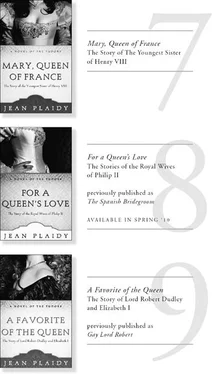Jean Plaidy - The Murder in the Tower - The Story of Frances, Countess of Essex
Здесь есть возможность читать онлайн «Jean Plaidy - The Murder in the Tower - The Story of Frances, Countess of Essex» весь текст электронной книги совершенно бесплатно (целиком полную версию без сокращений). В некоторых случаях можно слушать аудио, скачать через торрент в формате fb2 и присутствует краткое содержание. Жанр: Старинная литература, на русском языке. Описание произведения, (предисловие) а так же отзывы посетителей доступны на портале библиотеки ЛибКат.
- Название:The Murder in the Tower: The Story of Frances, Countess of Essex
- Автор:
- Жанр:
- Год:неизвестен
- ISBN:нет данных
- Рейтинг книги:3 / 5. Голосов: 1
-
Избранное:Добавить в избранное
- Отзывы:
-
Ваша оценка:
- 60
- 1
- 2
- 3
- 4
- 5
The Murder in the Tower: The Story of Frances, Countess of Essex: краткое содержание, описание и аннотация
Предлагаем к чтению аннотацию, описание, краткое содержание или предисловие (зависит от того, что написал сам автор книги «The Murder in the Tower: The Story of Frances, Countess of Essex»). Если вы не нашли необходимую информацию о книге — напишите в комментариях, мы постараемся отыскать её.
The Murder in the Tower: The Story of Frances, Countess of Essex — читать онлайн бесплатно полную книгу (весь текст) целиком
Ниже представлен текст книги, разбитый по страницам. Система сохранения места последней прочитанной страницы, позволяет с удобством читать онлайн бесплатно книгу «The Murder in the Tower: The Story of Frances, Countess of Essex», без необходимости каждый раз заново искать на чём Вы остановились. Поставьте закладку, и сможете в любой момент перейти на страницу, на которой закончили чтение.
Интервал:
Закладка:
“They say there is no end to the honors that man has taken to himself.”
“It may well be.”
“You do not care?”
“I am past caring.”
“I am not then. And never shall be.”
“That is a tragedy for you.”
She turned on him angrily; his calmness maddened her, the knowledge that he had been able to build a life for himself out of these ruins, while she had failed, was more than she could bear.
“It might never have happened. You could have persuaded James. You should have been more subtle … a little more like his newest friend, my Lord Buckingham.”
“And you, Madam,” he retorted, “should never have stained your hands with the blood of my friend.”
She turned away and ran to her bedchamber where she locked herself in and wept until she believed she had no tears left. Tears of rage and frustration.
“Better would it have been if they had taken me to Tyburn,” she cried. “Better if they had hanged me by the neck as they did poor Anne Turner. Anything would have been more desirable than this life of mine.”
After that they avoided each other. It was better so.

In one of his favorite palaces—Theobald’s in the parish of Cheshunt—the King lay dying.
James had no illusions; he knew this was the end. He was in his fifty-ninth year and had been a king for almost the whole of his life: James VI of Scotland since he was little more than a baby and his mother’s enemies had insisted that she abdicate in his favor; James I of England for the last twenty-three years.
“A goodly span,” he murmured, “and when a man suffers from a tertian ague and gout it is time he said goodbye to earthly pleasures. Perhaps I have been over-fond of my wine, but it is no bad thing to be over-fond of the things life has to offer.”
It was characteristic of him that he wondered what posterity would think of him. The British Solomon! How much had his wisdom profited his country? Would they remember him as a wise ruler, or the King who had gone in terror of the assassin’s knife since the Gowrie and Gunpowder Plots? Would they remember him as the King who was excessively fond of his favorites?
Steenie had not always been a comfort. He had grown arrogant like the rest. Steenie would look after himself. He was already a friend of Charles and they had jaunted to Spain together when Charles went to woo the Infanta. And Charles was affianced now to Henrietta Maria the daughter of Henry IV of France and sister of the reigning King Louis XIII. It would be a Catholic marriage for Charles which might cause trouble; there could clearly be no more persecution of recusants with a Catholic Queen on the throne. But that was Charles’s affair—no longer his.
It was strange to think of the end. No more hunting, no more golf, no more laughter at the pranks of Steenie and the rest; no longer would he sign to a handsome young man to give him his arm to lean on.
The old life was passing.
And as he thought back over the years there was one whom he could not forget, and had never forgotten. Often during the years he had longed to recall him. Yet how could he recall a man who had been condemned for murder?
“Robbie was no murderer,” he told himself, as he had often during the hours of the night when he had awakened from some vague dream of the past, haunted by a handsome affectionate young man. “I’ll bring him back. He shall have his estates back.”
But by light of day he would say: “I canna do it. It would serve no good purpose. How could Robert take up his old place now?”
It was nearly ten years since he had seen Robert, and that was a long time for a King to remember. And for all those years Robert had remained virtually a prisoner.
There was one thing he would do before he died. Robert should have a full pardon. His estates should be returned to him. As for the woman—she must have her freedom. He could not keep one prisoner and not the other.
It must be his first concern to pardon Robert.
The pardon was given; and the documents drawn up which would make Robert a rich man once more.
But James had not known how little time there was left to him, and he died before he could sign those documents.
But for Robert and Frances there was change at last: and that March of the year 1625 when James died in Theobald’s Palace, they were at liberty to go where they would. James’s last gift to them was freedom from each other.
THE SOLACE
T he Earl of Somerset was no longer a young man; it was nearly thirty years since he had been found guilty of murder by his peers; yet there were times when it seemed even longer. Looking back, it appeared to him that he had been three people: an ambitious young man looking for a place at Court; the most powerful man in England; and a man who had learned to understand himself and life, and had contrived to make something worthwhile out of disaster.
It astonished him often that the last phase of his life had been the happiest; was that the reward of a successful life? To have learned one’s lessons; to have come to an appreciation of the true blessings the world had to offer?
He believed so; and when he was with his daughter—so like her mother and yet how different!—he was content.
Yet even after he had received his full pardon, life had been uneasy.
Frances had gone often to Court, but she had not been happy. She did not enjoy the glory under Charles and Henrietta Maria that she had known when James and Anne were on the throne. Who was this Frances Howard? was a constant question. Wife of the one-time favorite who had fallen from grace; daughter of the Earl of Suffolk and his Countess of whose reputation for fraud all were aware; great-niece of that old rogue Northampton who had died in time to save himself from scandal; and worst of all—a self-confessed murderess.
She was angry; she was frustrated; she was melancholy; but she could not stay away from Whitehall.
Back and forth to Court; growing older, sullen, always seeking what could never be hers; resenting that growing love between her daughter and husband, who had found happiness together.
There was no happiness for Frances. Fears had come with the gnawing pain which at first she ignored; but eventually it would not be ignored. More insistent it grew until it dominated her life.
There were no more visits to Court; there was only pain that grew worse with every day.
Sometimes she lay on her bed and screamed in her agony; sometimes she lost consciousness; at others she would wander in her mind and those who attended her would hear her say: “So you are there … mocking me? You are telling me you suffered such pains. Is this your revenge, Tom Overbury?”
It was a relief when at last her pains were no more. She had lived thirty-nine turbulent years; and sixteen had elapsed since she had faced her judges.
But when she was no longer there the memories began to fade. The days were happier; there was the girl nearly seventeen, a lovely blooming creature with a deep affection for the father who, because of their exile, had been closer to her than parents often were.
He was poor by comparison with what he once had been, for his only possessions were now a house at Chiswick and a small income.
“It is enough for our needs,” Anne told him; and he rejoiced in his daughter.
He would have been completely happy if she could have remained in innocence, but there had been documents and books written about the case of Sir Thomas Overbury and it was inevitable that one day something of this nature must fall into Anne’s hands.
Читать дальшеИнтервал:
Закладка:
Похожие книги на «The Murder in the Tower: The Story of Frances, Countess of Essex»
Представляем Вашему вниманию похожие книги на «The Murder in the Tower: The Story of Frances, Countess of Essex» списком для выбора. Мы отобрали схожую по названию и смыслу литературу в надежде предоставить читателям больше вариантов отыскать новые, интересные, ещё непрочитанные произведения.
Обсуждение, отзывы о книге «The Murder in the Tower: The Story of Frances, Countess of Essex» и просто собственные мнения читателей. Оставьте ваши комментарии, напишите, что Вы думаете о произведении, его смысле или главных героях. Укажите что конкретно понравилось, а что нет, и почему Вы так считаете.











